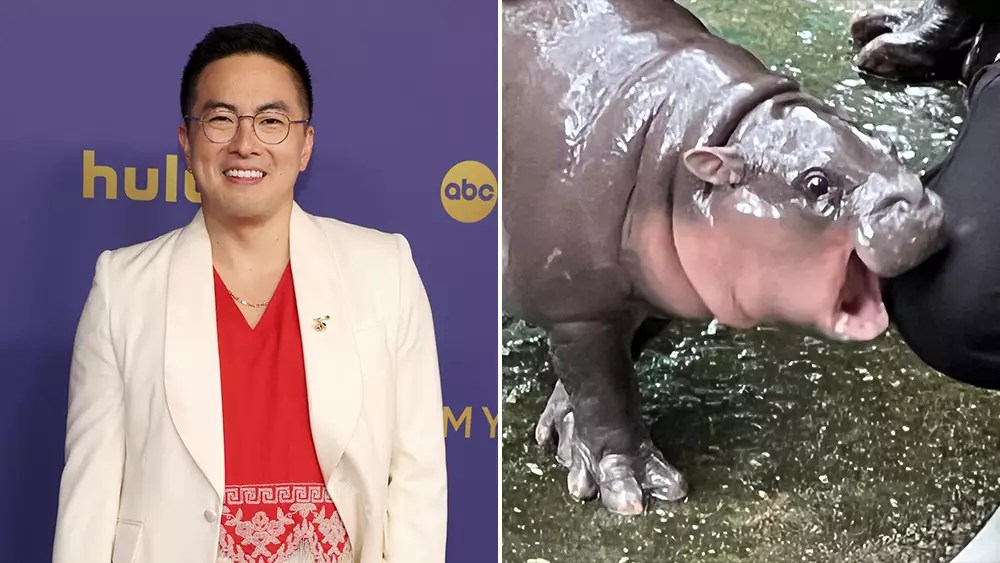In a world where internet culture often blurs the lines between celebrity and the common individual, the emergence of Moo Deng, a pygmy hippopotamus, has taken social media by storm. Played by the ever-charismatic Bowen Yang during the Season 50 premiere of “Saturday Night Live’s” Weekend Update segment, Moo Deng transcends simple comedic representation. Instead, he embodies a broader discussion around personal boundaries, the dynamics of parasocial relationships, and the often unrecognized challenges faced by public figures—whether they are animals or humans.
Moo Deng’s narrative is not merely a humorous take on the life of a zoo animal; it serves as a poignant commentary on the expectations placed on public personas. Yang humorously critiques the tendencies of fans to treat celebrities as personal friends, demanding their time and attention as if they are entitled to it. “Women owe you nothing!” Moo Deng retorts, calling for respect and the acknowledgement that individuals in the public eye, irrespective of their species, have their own lives and boundaries. This humorous yet assertive stance resonates powerfully in an age when social media can distort perceptions of reality and foster unhealthy dynamics.
The playful yet critical nature of Yang’s portrayal of Moo Deng cleverly points to the larger issue of fan interaction that many public figures encounter. The concept of a “parasocial relationship”—where a fan feels a bond with a celebrity despite having limited personal interaction—can lead to unrealistic expectations. Yang encapsulates this feeling when Moo Deng declares, “Do not yell my name or expect a photo just because I’m your parasocial bestie.” It serves as a reminder that our digital interactions do not equate to genuine friendships or entitlements.
Moreover, Moo Deng’s introduction of the idea that he will not be participating in upcoming political endorsements sharpens the satire. This represents not only an adherence to personal integrity but also pokes fun at the alarming trend of celebrities being coerced into political conversations, often without any sense of accountability for their statements. The character’s self-deprecating humor, including the request to bite Colin Jost’s knee, illuminates the absurdity of these expectations and underlines the need for emotional boundaries that are crucial in navigating public life.
In tandem with Moo Deng’s antics, the episode also prominently featured Devon Walker portraying New York City’s Mayor Eric Adams. Walker’s comedic representation, laden with sarcasm about crime rates and the mayor’s recent federal indictment, complements the overall theme of the segment. By employing humor to address serious issues such as civic incompetence and corruption, Walker utilizes comedy as a means for critique, reflecting a cultural tendency to use satire as a tool of social commentary.
The portrayal of Mayor Adams—claiming that he has successfully transformed New York into a “swag-tropolis”—highlights the often superficial metrics by which political success is judged. Such caricatures encourage the audience to engage critically with their leaders and question the legitimacy of political narratives. As the satire unfolded, the call to “Free Diddy” encapsulated the absurdity surrounding celebrity culture, thereby linking the two segments of humor and critique into a cohesive discussion tapestry.
The New Dynamics of Celebrity and Consumer Relationships
Ultimately, both Moo Deng and Walker’s characters encapsulate a rotating conflict inherent in modern entertainment: the interplay of privilege, celebrity, and audience expectation. As Moo Deng commands a form of respect for personal space, it suggests an awakening to the fact that both fans and public figures must redefine their relationships in a mutually respectful manner.
These comedic interpretations, intertwined with significant social commentary, reflect a pressing need for recalibration in how we perceive and interact with our cultural icons. In an era dominated by virality and the looming shadow of social media, the portrayal of characters like Moo Deng prompts audiences to reconsider what it means to empathize while establishing boundaries—both essential in the discourse around fame and representation in contemporary society.


Leave a Reply